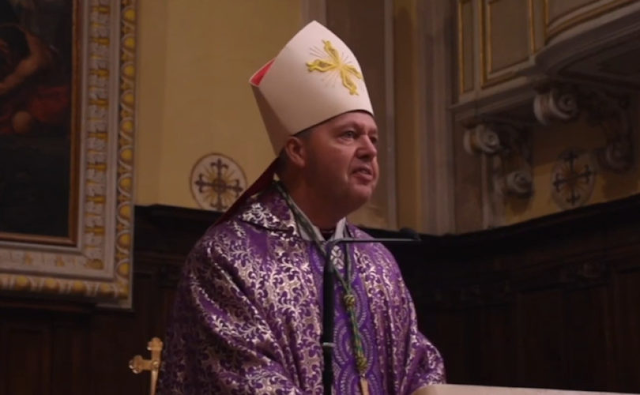Dutch Bishop Mutsaerts slams German Synodal Assembly
German bishops hand in their staffs
The Synodal Path pursued by the German Catholic Church claims to build on the 2nd Vatican Council. "For today's reflection on the people of God and the priesthood, the texts of the Council remain authoritative," says the Basic Text Priestly Existence. But a closer look at the texts of the Synodal Path proves just the opposite. Document The Celibacy of Priests, for example, says: "A superiority of the celibate form of life can no longer be responsibly advocated since Vatican II." Is that true? No. In fact, the Council says exactly the opposite, namely that candidates for the priesthood "must clearly recognise the primacy of virginity consecrated to Christ" (Optatam Totius 10).
Is this a regrettable slip-up? By no means. For instance, the basic text on Priestly Existence Today asserts, "It is no coincidence that the Vatican II Priestly Decree consistently uses not the term priest ('sacerdos') for the minister, but 'presbyter' (elder, proxy). This confirms a change in the image of the priest by the Council, away from a sacred minister of worship to an official in the congregation." Again, none of this is true at all. For instance, the decree Optatam Totius no 12 says: "Every priest, therefore, according to his degree of ordination, represents Christ". The Latin text does not use the term "presbyter", as is claimed, but "sacerdos"! From the point of view of the Council, the term "presbyter" in no way replaces the term "sacerdos", but is used to distinguish it from "episcopus", both of which are part of the "sacerdotium" (cf. Presb.Ordinis 7).
The false and misleading appeal to the Second Vatican Council is deception; it is deception towards the faithful. For the priesthood, according to the teaching of the Council, is by no means merely a functional office of an "elder", but includes a sacerdotal understanding of the priest as the one who offers the Eucharistic sacrifice, as the Council teaches when it speaks of the "mystery of the Eucharistic sacrifice, in which the priests fulfil their principal task" (PO 13); and again the original speaks of the "sacerdotes".
But when the Council declares that the imposition of the Eucharistic sacrifice is the primary task of priests, the Synodal Path's claim that the Council "overcame a sacerdotal-cultural conception of the ministry" (Basic Text on Women 5.2) is not true. And so the clearly deliberate deception of the faithful continues. The Synodal Path acknowledges that the Council's "attitude towards ... atheism" and claims: "The Second Vatican Council ... no longer excludes and does not condemn" (Orientation Text On the Way... 57). This too is factually incorrect, as the Council declares that the Church "unequivocally rejects atheism" (Gaudium er Spes 21), while freely inviting atheists to "appreciate the Gospel of Christ without bias".
The fantasy council referred to by the German Synodalists does not exist. Incidentally, the Council also expresses condemnation elsewhere: "Abortion and the killing of the child are abominable crimes" (GS 51; cf. 79, Lumen Gentium 48). The Synodal Path wrongly invokes the Council by ascribing doctrines to it, even though the Council teaches exactly the opposite. Moreover, it contains positions that generally contradict the Council, for example when the Synodal Path adopts the new doctrine: "Same-sex sexuality - also realised in sexual acts - is therefore not a sin separating from God, and it should not be judged as intrinsically evil" (Document on Revaluation of Homosexuality). Vatican II nowhere mentions homosexuality, but only because it is clear to the Council that the "intimate union as mutual giving of two persons" (GS 48) is legitimate before God only in the marriage of a man and a woman".
Those who wish to be faithful to the Vatican Council cannot simultaneously profess the content of the (German) Synodal Path - the statements are mutually exclusive. Incidentally, the Synodal Path should also be consistent and demand not only an amendment of the Catechism, but also some excerpts from Holy Scripture, the Word of God, to which the Catechism ultimately refers (Gen 19:1-29; Rom 1:24-27; 1 Cor 6:9-19; 1 Tim 1:10). In short, the German bishops - after all, they agreed to the documents by a majority - know better than the ordained writers.
Also, the Bible as a source of knowledge of faith serves the Synodal Path rather marginally. According to the Council's teaching, divine revelation, contained in Sacred Scripture and Sacred Tradition, is complete (cf. Dei Verbum 4, 7-10). In contrast, the Synodal Path declares that "in the faith of the faithful the self-communication of God is constantly renewed" (orientation text On the Way...), inventing the "signs of the times" as a new source of revelation alongside Scripture and Tradition.
The logical consequence of this view is that what yesterday was considered a sin (e.g. homosexual acts) can today be seen as a blessing; that doctrines which yesterday were claimed to be infallible are today considered discriminatory and therefore sinful (e.g. the exclusion of women from priestly ordination). However, such an understanding of permanent change in the content of the faith has nothing in common with the Council's teachings, nor with divine revelation.
What was once infallibly taught remains infallible and is not subject to the spirit of the age.
Having already created a provisional leadership institution with the Synodal Path, deliberately established in violation of canon law, a permanent body is created with the Synodal Council, which replaces the leadership office of the bishop with a collective body consisting of bishops, priests and laity. With this, the bishops have surrendered their staffs. They may now abstain morally only if something does not suit them. And a few episcopal "no" votes are tolerated as long as they do not interfere with the approval of Synod decisions. The Synodal Path has divided Catholics in Germany. We have a word for that: schism.
Long interview in English with the Bishop










.jpeg)

Comments